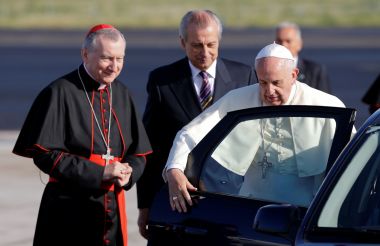Why Pope Francis may not be particularly welcome in Poland

On the face of it, Pope Francis's trip to Poland for World Youth Day (WYD), which begins tomorrow, will be a unifying triumph for him, the Church, the 2 million people gathering from 187 countries and for the devoutly Catholic country itself.
Yet beneath the surface, there is a tension between this Pope and a country which has veered towards a hard-right approach to immigration and which still sees John Paul II as "the Pope".
Last October, the ultra-conservative Law and Justice party (PiS) took power. Representatives of the PiS have long been involved in controversies and accusations of racism over the years.
At the same time as Pope Francis was calling on the world to open its arms to refugees amid Europe's worst migration crisis since World War II, Poland refused to take in newcomers because of supposed security risks.
And when on Maundy Thursday this year Francis washed the feet of three Muslim asylum seekers, there were "howls of criticism" and even "hate speech" in Poland, according to Polish media.
Ignacy Dudkiewicz, an editor for the Kontakt magazine told AFP that there was unprecedented online abuse aimed at the Pope following the gesture. "Francis has been dragged through the mud because of his position on refugees," he said.
True, Prime Minister Beata Szydlo released 803,000 Euros in funds for camps in Jordan, Lebanon and Turkey just ahead of Francis's arrival. But critics dismissed it as a token move.
"Many here think the pontiff's message of mercy and compassion for refugees and the poor is exaggerated," said Zbigniew Nosowski, editor of the respected Catholic monthly Wiez.
Even Polish bishops failed to mention Pope Francis in their address to the faithful gathering for WYD, while John Paul II was referenced three times.
Dudkiewicz said: "Bishops here formally support the pontiff's message of hosting refugees, but they do so without much conviction."
He added that "the Polish Church is afraid of losing its position, both institutional and financial, he added.
Pawel Boryszewski, a sociologist of religion, said of Pope Francis's famously humble style: "The Polish hierarchy is very worried. A bishop on a bike and in sandals, this doesn't go down well here...Poles don't really know Francis, just like this Argentinian pope doesn't know Poland."
Jaroslaw Makowski, a liberal Polish theologian, said: "I am absolutely convinced the meeting between Francis and the Polish Church will be challenging for both sides. When he was invited to Poland in 2013, he was unknown... But after a few months it became clear he isn't what was expected...but someone who wants to shake up the Church and push it off the path familiar to the Polish Church."
Other, domestic social issues are also a cause for division. Although Pope Francis has not changed Church doctrine, he is widely, if inaccurately, seen as liberal on issues such as homosexuality and women.
According to a conservative Polish commentator, Tomasz Terlikowski, the popularity of John Paul II was down to his rigid adherence to doctrine.
"The World Youth Day, like any previous meeting between John Paul II and young people, serves as...proof the Church in the West is losing them...because of what it offered them," Terlikowski wrote this week. "The young have been leaving the Church because what it offers them is equal to that of [the secular] world, only veiled in incense...Will Francis be able to inspire the youth the way John Paul did? It will depend on what he requires of them."
Tomasz Dostatni, OP, a writer and pastor in Poland who lives in Lublin, told America Magazine that his country "should make a greater effort to understand Pope Francis in the context of South America, just as the people of Western Europe, after the election of John Paul II, tried to understand the specific reality of life in a communist state from which the pope then came."
Meanwhile, Vatican Radio reported that Pope Francis has decided to cancel a planned official discourse to Polish bishops tomorrow, instead opting for a private meeting with them which can be more "spontaneous".











